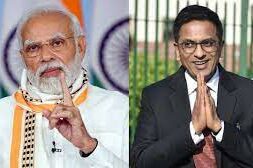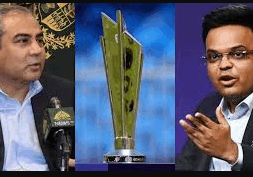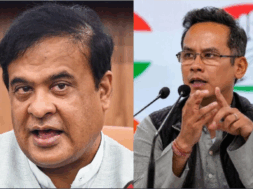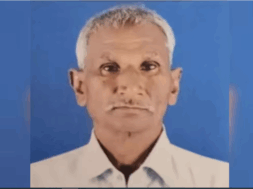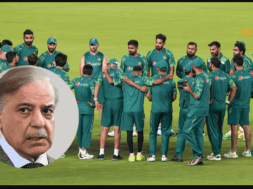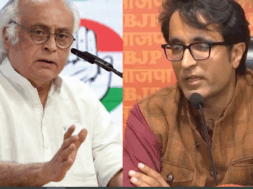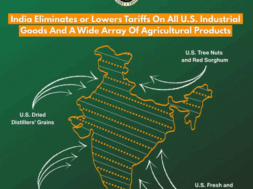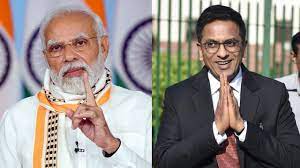
Manas Dasgupta
NEW DELHI, Jan 22: Within hours of the union law minister Kiren Rijiju posted some “sane” voices opposing the collegium system further intensifying the already hot friction between the government and the judiciary over the appointments in judiciary, the prime minister Narendra Modi lauded the Chief Justice of India DY Chandrachud’s recent comments on making Supreme Court judgments available in regional languages.
Quoting the CJI’s comments on Saturday at an event organised by the Bar Council of Maharashtra and Goa in Mumbai, Modi tweeted on Sunday, “At a recent function, the Hon’ble CJI Justice DY Chandrachud spoke of the need to work towards making SC judgments available in regional languages. He also suggested the use of technology for it. This is a laudatory thought, which will help many people, particularly youngsters,” Modi wrote.
“India has several languages, which add to our cultural vibrancy. The central government is undertaking numerous efforts to encourage Indian languages including giving the option of studying subjects like engineering and medicine in one’s Matru Bhasha (mother tongue),” read another tweet from the PM, who had stressed on the need to use local languages in courts several times last year.
Earlier speaking at an event in October, Modi had said since obscurity of law creates complexity, new laws should be written in lucid manner and in regional languages to bring in “ease of justice” so that even the poor can easily understand them. Legal language, he said, should not become a hurdle for citizens.
He had spoken of the matter in May as well, at another event which was attended by then Chief Justice NV Ramana. “This is a serious issue… It will take some time… There are lots of hurdles, bottlenecks, hiccups in the implementation of regional languages in High Courts,” Justice Ramana had said.
The Prime Minister’s tweets on Sunday come amid a face-off between the government and the judiciary over the issue of judicial appointments, in which the government seeks a bigger role. Rijiju had cited a retired judge’s comment on the subject to underscore what he called “sane views” of “the majority.”
Retired Delhi High Court judge RS Sodhi, in a recent interview, has accused the Supreme Court of “hijacking” the constitution. Posting the clip of the interview on his Twitter handle, Rijiju wrote, “Voice of a judge… Real beauty of Indian Democracy is its success. People rule themselves through their representatives. Elected representatives represent the interests of the people and laws. Our judiciary is independent, and our constitution is supreme. Actually, majority of the people have similar sane views. It’s only those people who disregard the provisions of the Constitution and mandate of the people think that they are above the Constitution of India,” he added.
The remarks caused a sharp turn to the friction between the government and the judiciary over the appointment of judges and which parts of the constitution can be changed by parliament. Sodhi’s comments that “The Supreme Court has hijacked the constitution for the first time. They said we will appoint [judges] ourselves. The government will have no role in this,” was quipped by Rijiju as the “sane vice of the majority” slamming the present collegium system in which the government has no role to play.
“High courts are not subservient to the Supreme Court [but] high court judges start looking at the Supreme Court and become subservient,” Sodhi said, explaining why he feels that the system of a panel of Supreme Court judges, called the collegium, appointing judges for the high courts and Supreme Courts does not work.
Justice Sodhi also said the top court cannot frame laws as it does not have the right to do so. “…Only Parliament will amend Constitution. But here I feel the Supreme Court for the first time ‘hijacked’ the Constitution. After ‘hijacking’ they [the SC] said that we will appoint [judges] ourselves and the government will have no role in it,” Justice Sodhi said in Hindi.
Rijiju’s statement was the latest in a long-running disagreement between the judiciary and the government that has intensified in recent months. From comments by Mr Rijiju to Vice President Jagdeep Dhankhar, judiciary has come under increasing pressure to change the system of judges getting the final word on appointment of judges.
The government has called for a bigger role in judges’ appointment, questioned the lack of its veto power, and criticised the encircling of certain principles of the constitution as its “basic structure,” not open to changes by parliament, by the Supreme Court in 1973.
On Friday, the Supreme Court Collegium took an unprecedented step of making public the government’s objection to some of its recommendations for judgeship. These names included Saurabh Kirpal (Delhi High Court), whose gay status was objected to; Somasekhar Sundaresan (Bombay HC) and John Sathyan (Madras HC), who shared social media posts that were critical of the Narendra Modi government. Rejecting the Law Ministry’s objections, the Collegium reiterated five of its earlier recommendations, including these three and urged the government to expeditiously clear their appointments.
